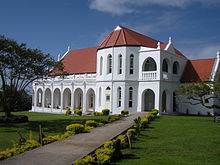
Dix Newell
The Samoan Islands were split into two sections in 1904. The eastern islands became territories of the United States and are today known as American Samoa. The western islands became known as Western Samoa under German control. In 1914, control of Western Samoa was passed to New Zealand, which administered the country under the auspices of the League of Nations and later as a United Nations trusteeship. In 1962, the country was granted independence. In 1997, the country’s name was changed from Western Samoa to the “Independent State of Samoa”.
Samoa consists of two large islands (Upolu and Savai’i) and seven small islets. The capital, and largest city (Apia), is located on the island of Upolu. The population of the country is approximately 183,000 people, and is about 92.6 % Samoan, 7% Euronesian (mixed European and Polynesian) and 0.4% European. Almost 99% of the population is Christian. The principal religious organizations are the Congregational Christian Church, the Roman Catholic Church, the Methodist Church and The Church of Jesus Christ of Latter-day Saints.
Samoa has a parliamentary democracy based on the British system, but modified to accommodate Samoan traditional customs (Fa’a Samoa). The Constitution takes substantial account of Samoan traditions and culture. The legal system is based on English common law and Samoan traditional customs.
Samoa does not declare an official religion of the state, although the Preamble to the Constitution of Samoa declares that “Western Samoa should be an Independent State based on Christian principles.” The government, in practice, generally respects religious freedom while largely acquiescing to the de facto regulation of religious affairs in some villages by the governing chiefs (matai) and the village council (fono). Religious observance remains high throughout the country.
There is village societal pressure to participate in church service and other activities to support local church leaders and projects financially. However, there are tensions between Fa’a Samoa and religious rights. For example, traditionally, smaller villages tend to allow only one religious organization. The village chiefs and village council presume, on the basis of custom and tradition, to have power to prevent other religious organizations from establishing a foothold in a village. Larger villages may have several churches serving different denominations. Even in these larger villages, the village chiefs and village council may be able to hinder newer religious organizations from establishing a presence.
The Constitution of Samoa clearly establishes religious freedom as a fundamental human right. Articles 11, 12, and 13 of the Constitution not only establish these religious freedoms and basic rights, but they also establish the expected role of the government in terms of it relationships with religious organizations.
For more, please click the links below: